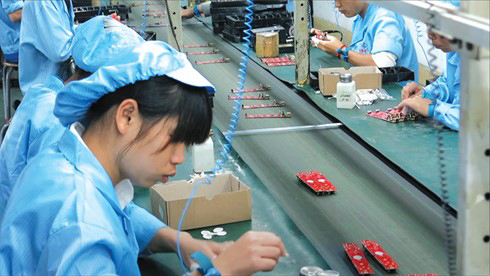By Tiffany Ran
Northwest Asian Weekly

“Death by Design”
![]()
![]()
![]()
![]()
Sue Williams has worked in China for many years and directed five feature documentaries about China, told through the perspective of its citizens. In her most recent documentary, “Death by Design,” which debuted at the Seattle International Film Festival in May, she uncovers the environmental costs of the manufacturing and disposal of digital devices in the international electronics industry — consequences some assume is specific to China, but as the film shows, affect the global environment and economy at large.
In the world of digital reliance, the cell phone, tablet, or laptop has become the most beloved item for billions of users across the globe. While a cascade of new devices floods the market promising better entertainment, higher productivity, and a brighter future, the future of discarded gadgets is largely unknown. For Williams, the upgrade happy culture of the Information Age has led to a big piece of missing information.
“It’s sort of odd to me, kind of incredible that nobody has looked under the covers to say, ‘What’s going on inside these things? How are they made? How are they updated?’ We’ve been wrapped into the heroic narrative of great inventors, but if it’s too good to be true, it’s probably too good to be true. I think we need to take a step back from the excitement.”
From a small town in New York, where former IBM employees are wracked with serious health issues from exposure to chemicals, to the Silicon Valley in California, where local citizens fight to hold tech companies accountable for its ground water pollution, “Death” maps the environmental and social consequences that arise from the production (and eventual waste) of our most beloved cell phones and personal computers.
Williams herself is an owner of an iPhone, one she admits rarely leaves her hand. But she was shocked years ago to learn that an industry we have all trusted for our productivity is linked to a supply chain with a staggering environmental and human cost. “Death,” at its steady pace, takes a jarring look at these costs and follows these beloved devices from its inception on the Foxconn factory belt, to its accelerated death in landfills where chemicals leach into the surrounding land, evaporate into the air and clouds that blow from Asia, to the shores of sunny California, and debilitates entire communities made up of factory and tech workers suffering from mass unexplained cases of cancer.
“The corporate PR is so sophisticated and so polished that it’s as beautiful as your phone,” said Williams.
“They can say things, but it’s not really transparent. My kind of fantasy would be that Apple says, ‘We’re not going to produce the iPhone 7 in three months. We’re going to take three years to look at our supply chain and be transparent.’ Not just [for them] to claim that they’re eco-friendly just because the headquarters is superbly green, but that their supply chain really is.”
The awareness from watching “Death” inspires an internal discord meant to make us rethink our relationship with our cell phones and laptops, but William insists that there are solutions beginning with awareness to reduce the frequency and rate at which our gadgets end up in landfills. “Death” with its ominous message also spotlights innovative companies like iameco that makes environmentally-friendly laptops made from recycled e-waste and iFixit, which provides tools and information for consumers to repair devices and use it for as long as possible.
“We’ve seen it with clothing companies, we’ve seen it with sneakers, that people get upset when they hear that workers in Bangladesh and Central America are having their lives ruined because they’re making our jeans or our sneakers, the brands change. They do change. For so long, we thought this was a clean industry that there hasn’t been a demand for it. It will be interesting to see how they do respond if there is a groundswell of demand for them to clean up.”
The process behind applying for film festivals is extensive, and while it was not intentional for “Death” to make its premiere in Seattle, Williams believes that the premiere in Seattle, which many tech companies call home, is apt. From Seattle, “Death” will go on to screen at Sheffield Doc/Fest in the UK and the Martha’s Vineyard Film Festival.
For more information about “Death by Design,” visit deathbydesignfilm.com.
Tiffany Ran can be reached at info@nwasianweekly.com.



